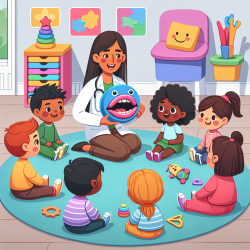Introduction
In the realm of child development, anxiety disorders present a significant challenge, affecting approximately 5% of children under 12 years old. These disorders, if left untreated, can lead to severe consequences, including depression and substance abuse. A recent study, "Development of ‘Learn to Dare!’: An online assessment and intervention platform for anxious children," sheds light on innovative solutions to address this issue. This blog explores how practitioners can leverage the findings of this study to enhance their skills and improve outcomes for anxious children.
Understanding the ‘Learn to Dare!’ Platform
The ‘Learn to Dare!’ platform is an online intervention based on Cognitive Behavioral Therapy (CBT) designed specifically for children aged 8-13 years with anxiety disorders. This platform offers a structured program consisting of eight sessions that include psycho-education, exposure, cognitive restructuring, and relapse prevention. The intervention is designed to be minimally reliant on therapist support, making it highly accessible and scalable.
Key Findings from the Study
The study highlights several critical insights:
- Efficacy of Online CBT: The research indicates that online CBT can be as effective as face-to-face therapy, providing a viable alternative for children who face barriers to accessing traditional therapy.
- Inhibitory Learning Model: The study introduces the concept of inhibitory learning as a more effective method than traditional exposure techniques. This approach focuses on creating strong learning experiences that challenge children's expectations about feared situations.
- Minimal Parental Involvement: Unlike previous studies, this intervention does not heavily rely on parental involvement, focusing instead on empowering the children directly.
Practical Implications for Practitioners
Practitioners can draw several actionable insights from this study:
- Incorporate Online Interventions: By integrating online platforms like ‘Learn to Dare!’, practitioners can extend their reach to children who might not otherwise have access to therapy due to geographical or social barriers.
- Focus on Inhibitory Learning: Adopting the inhibitory learning model in practice can enhance the effectiveness of exposure therapy by promoting stronger and more lasting changes in children's anxiety responses.
- Empower Children Directly: Reducing the dependency on parental involvement can foster greater independence and self-efficacy in children, leading to more sustainable outcomes.
Encouraging Further Research
While the ‘Learn to Dare!’ platform provides promising results, it also opens avenues for further research. Practitioners are encouraged to explore the following areas:
- Mediation Studies: Investigating the specific mechanisms through which CBT affects anxiety can provide deeper insights into optimizing therapy for children.
- Longitudinal Studies: Long-term studies can help understand the sustained impact of online interventions on child anxiety.
- Customization and Personalization: Research into how interventions can be tailored to individual cognitive and developmental levels could enhance the effectiveness of online CBT.
Conclusion
The ‘Learn to Dare!’ study represents a significant advancement in the treatment of child anxiety disorders. By embracing online interventions and focusing on innovative therapeutic models, practitioners can play a pivotal role in transforming the landscape of child mental health care. For those interested in delving deeper into the research, the original paper offers a comprehensive overview of the study's methodology and findings.
To read the original research paper, please follow this link: Development of ‘learn to dare!’: An online assessment and intervention platform for anxious children.










